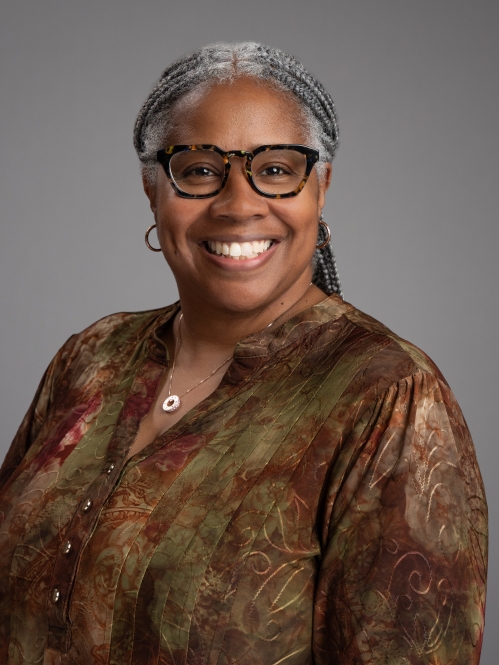Tawanda Hubbard
PhD in Family Science and Human Development, Montclair State University; DSW, MSW, Rutgers School of Social Work; and BS Business Administration – Management, Bloomfield College

Bio
Dr. Tawanda Hubbard is a social work educator, practitioner, and family science and human development scholar. Prior to joining the faculty, Dr. Hubbard taught at Rutgers School of Social Work as a part-time lecturer for over nine years. She joined the faculty as an Associate Professor of Professional Practice in 2021. The same year Dr. Hubbard was honored with a national teaching leadership award in higher education by JV Educational Consultants. She recently received the Outstanding Professor for Excellence in Inclusion, Intersectionality, Diversity, Equity, and Advancement (IIDEA) Teaching Award at the May 2025 SSW graduation.
Dr. Hubbard is a Licensed Clinical Social Worker in New Jersey with over 20 years of experience in child welfare, behavioral and mental health, case management, and clinical practice. Dr. Hubbard has a small private practice and consulting firm. She is trained in diverse family therapy approaches, EMDR, and is a certified rational emotive and behavioral therapist (REBT), child sexual abuse therapist, and clinical supervisor. She designs curricula and provides workshops, keynotes, webinars, and publications connected to her scholarship and practice interests. Dr. Hubbard is the current president of the Rutgers School of Social Work Alumni Council. She is a past president of the NASW, NJ Chapter. She also serves on various councils, advisory boards, committees, and coalitions, and belongs to associations focused on social work, family relations, child and adolescent development, mental/behavioral health, child welfare, and diversity science initiative. Dr. Hubbard is a faithful member of the Alpha Kappa Alpha Sorority, Inc.
Dr. Hubbard recently graduated in May 2025 from Montclair State University with her second doctorate, a PhD in Family Science and Human Development. Her dissertation research focused on understanding how young Black women are transitioning into adulthood from foster care through the perspective of Black female social workers working in child welfare.
Courses Taught:
Clinical Social Work I
Clinical Social Work II
Clinical Social Work: Adolescents
Clinical Social Work: Families
Clinical Assessment and Diagnosis
Selected Recent Publications:
Hubbard, T. L. (accepted, May 2025). Sharing lessons learned: A social work and family practitioner’s reflections on creating accountable learning spaces to teach and discuss racism, race, and anti-racism through a liberatory consciousness lens. Groves Monograph: Civil Rights and Intersecting Identities: Social Movements for Equality and Justice, Summer of 2025.
Hubbard, T. L. & van Eeden-Moorefield, B. (2024). The psychological experience of separation, dissolution, and divorce. In A. E. Goldberg & G. Beemyn (Eds.), The Sage Encyclopedia of LGBTQ Studies, 2nd Edition. Thousand Oaks, CA: Sage Publications Inc.
Hutchinson, E. D. & Hubbard, T.L. (2024). Families. In Hutchinson, E.D. (ed.), Dimensions of human behavior: Person and environment 7th edition, (Chapter 10). Sage Publications.
Cummings, C. & Hubbard, T.L., & Walsh, J. (2024). Psychosocial person: Relationships, stress, and coping. In Hutchinson, E.D. (ed.), Dimensions of human behavior: Person and environment 7th edition, (Chapter 5). Sage Publications.
Lyons, P., Hubbard, T.L., Thompson, P., & Holder, K. (July 2024). Why we can’t wait. In Allen, D. (ed.). Why we can’t wait. Harambee Vision, National Association of Black Social Workers (NABSW) Magazine, p. 45-46.
Hubbard, T.L. (November 2021). Mental health in the Black community roundtable report. Part of the Fund NJ Grant was obtained by the Latino Action Network Foundation and Salvation for Social Justice. https://www.lanfoundation.org/public-files
Hubbard, T. L. (2019). Having difficult but necessary conversations with your field instructor, The New Social Worker, 26(1), 6-7.
Hubbard, T. L. (2017). It’s not all about the behaviors: Identifying and addressing relational neglect in adolescence within the familial environment, Reflections: Narratives for Professional Helping, 23(1), 52-65
Hubbard, T. L. (February 2015). We must never forget the progress and struggle of African Americans. NASW-NJ Focus, 24(1), pp.1, 8
